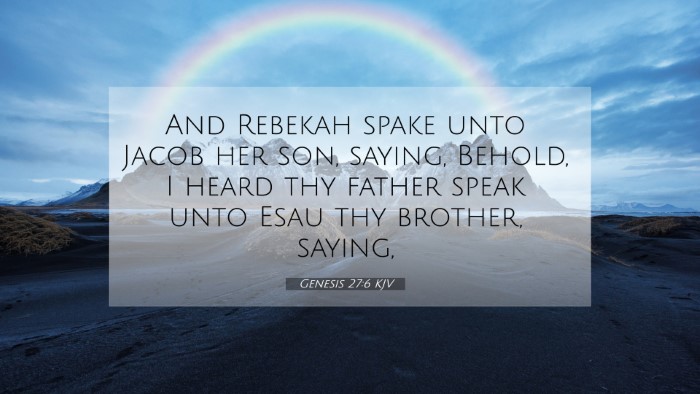Meaning of Genesis 27:6
Genesis 27:6 states: "And Rebekah spake unto Jacob her son, saying, Behold, I heard thy father speak unto Esau thy brother, saying," Here, we witness a pivotal moment in the narrative of the patriarchs, where Rebekah, the mother of Jacob and Esau, initiates a significant scheme that will alter the course of her family’s legacy.
Contextual Framework
The verse occurs in the context of Isaac preparing to bestow his blessing upon Esau, the firstborn. It reveals Rebekah’s reaction upon overhearing Isaac's plans, thus setting the stage for her intervention on Jacob’s behalf. This verse underscores themes of parental influence and manipulation in the Biblical narrative, which numerous commentaries delve into.
Commentary Insights
- Matthew Henry's Commentary:
Henry highlights the role of Rebekah as a key player in the divine prophecy concerning Jacob. He suggests that her actions, though morally ambiguous, are aimed at fulfilling God's promise that the elder (Esau) would serve the younger (Jacob). This shows a complex interplay between human action and divine intention.
- Albert Barnes' Notes:
Barnes notes that Rebekah’s overhearing of Isaac’s conversation reflects God’s providence. He points out that her motivations are rooted in love for Jacob, thus illustrating the familial strife that leads to significant theological implications, particularly regarding the lineage of Israel.
- Adam Clarke's Commentary:
Clarke discusses how Rebekah’s actions are indicative of the greater plan of God in the history of redemption. He posits that the tension between Esau and Jacob serves as a microcosm for the ongoing struggles between rival factions throughout Scripture.
Thematic Connections
Genesis 27:6 demonstrates the dynamics of family relationships and the consequences of deceitful actions. The emotional and spiritual ramifications of Rebekah’s decision echo throughout the Biblical narrative. The themes present in this verse can be connected to several other scripture passages:
- Genesis 25:23: The prophecy regarding Jacob and Esau's destinies.
- Romans 9:10-13: New Testament reflection on God’s choice of Jacob over Esau.
- Hebrews 12:16-17: A warning about Esau's unholy behaviors and their consequences.
- Galatians 4:22-23: Paul's expounding on the allegory of two covenants represented by Jacob and Esau.
- Malachi 1:2-3: God's love for Jacob and hatred for Esau contextualized in the theme of divine election.
- 1 Timothy 6:10: The love of money leads to all sorts of evil, paralleling the mess in the family due to greed for blessings.
- Exodus 20:3-17: The commandments concerning family and integrity resonate with the moral lessons gleaned from Rebekah's intrigue.
Understanding the Impact
Rebekah’s actions prompt discussions about morality, the rightful claims to blessings, and the overarching plans of God versus human scheming. The narrative suggests that while human motivations may be misguided, God's purpose prevails. Cross-referencing Biblical texts can provide deeper understanding into how these themes resonate throughout Scripture.
Bibliographical Cross-References
Those studying the implications of Genesis 27:6 may find the following tools for Bible cross-referencing beneficial:
- Bible concordance for contextual exploration.
- Bible cross-reference guide for identifying thematic connections.
- Tools for Bible cross-referencing to provide structured study.
- Cross-reference Bible study materials for deeper analysis of related themes.
- Comprehensive Bible cross-reference resources for extensive research.
Conclusion
The narrative initiated in Genesis 27:6 invites readers to explore the complexities of familial relationships and divine purpose. By employing cross-referencing methods, one can uncover rich layers of understanding that span both the Old and New Testaments, allowing for a fuller grasp of God’s unfolding plan through these ancestral stories.



